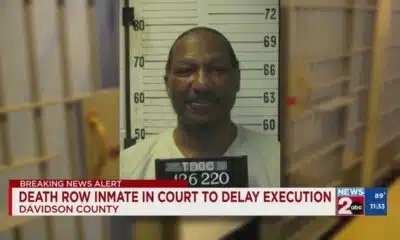News from the South - West Virginia News Feed
Fayetteville native becomes 71st WVU Mountaineer
SUMMARY: Fayetteville native Cade Kincade has been named the 2025-2026 WVU Mountaineer mascot, embodying a tradition filled with community values and pride for West Virginia. Growing up in Fayetteville, Kade appreciates the freedom and safety he experienced, shaping his love for the state and sports. His emotional announcement as Mountaineer reflected overwhelming excitement and dedication to representing WVU Athletics. Kade’s deep bond with West Virginia is evident in his academic and community service commitments. As he prepares for the passing of the rifle ceremony on April 4th, Kade aims to keep the spirit of West Virginia alive.
FOLLOW US ON FACEBOOK AND TWITTER:
https://facebook.com/WOAYNewsWatch
https://twitter.com/WOAYNewsWatch
News from the South - West Virginia News Feed
Morrisey says WV health won’t suffer with weakened vaccine laws. Experts disagree.
by Lori Kersey, West Virginia Watch
July 14, 2025
As the number of U.S. measles continues at a record high, West Virginia Gov. Patrick Morrisey has not backed down from his January executive order loosening the state’s strong school vaccine laws by allowing religious and philosophical exemptions for the shots.
At a news conference last month, Morrisey said his administration is not aware of “one shred of evidence” that the state allowing religious exemptions would have negative consequences on residents’ health.
“We’re not aware of one shred of evidence that by moving to be a state that respects religious liberty and exemption, that there is any negative public health effect,” Morrisey said June 24. “I dare the other side to provide that. They’re misleading you. We’re going to tell the truth.”
The executive order is based on the 2023 “Equal Protection for Religion Act.” Lawmakers this year voted down Senate Bill 460, which would have set the religious exemptions in state code. Morrisey maintains that the religious freedom law should give families the freedom not to vaccinate their kids if they choose to; he says his January executive order is merely an interpretation of that law.
Morrisey told a reporter that statistics show that in states that allow religious exemptions, the number of people who get religious exemptions for vaccines is not big enough to affect herd immunity, the resistance to infectious disease a community with a high rate of vaccination has.
But public health experts, including one of the state’s former health officers, disagree with the governor’s assertion. They say areas with looser school vaccine laws are more likely to have disease outbreaks.
“There is overwhelming evidence that vaccine exemption policies reduce vaccination coverage rates and increase the burden of vaccine-preventable diseases,” Richard Hughes, a George Washington University law professor and vaccine law expert, wrote in a statement to West Virginia Watch. He said Morrisey’s claim disregards “decades of public health research.”
Hughes pointed to a 2010 medical study in California that found that areas of high non-medical exemptions were 2.5 times more likely to have outbreaks of pertussis, also known as whooping cough, than those with lower non-medical exemptions.
Another analysis estimated that a state with easier nonmedical vaccine exemption procedures is nearly twice as likely to experience a measles outbreak compared with states with more difficult exemption policies.
“The public health evidence is clear: well-designed vaccine exemption policies can help protect child health by maintaining high immunization coverage, preventing outbreaks, and protecting vulnerable children who cannot be vaccinated for valid medical reasons,” Hughes said.
“This is not just about religious liberty. It’s about whether one official can unilaterally weaken a system that has long protected the health of all children in the state,” Hughes said.
West Virginia currently does not have a health officer. State Secretary of Health Arvin Singh appeared at the governor’s news conference and spoke in support of religious exemptions. Singh said that the executive order “ensures that people of faith are not punished for making personal, prayerful decisions about their children’s health.”
Singh, who has a Master of Science in health care leadership and a master’s degree in public health, said there’s not “meaningful evidence,” religious exemptions have led to an increase in disease incidence at the population level.
He pointed to Florida, Ohio and Pennsylvania as states that maintain 90% rates for school vaccinations while allowing religious exemptions.
Data from the Ohio Department of Health indicate that 86% of kindergarten kids got all their required shots in the 2023-2024 school year. In Florida, that number was 88% in the 2023 school year. Pennsylvania kindergarteners had a 94% vaccination rate for measles during the 2024-2025 school year.
A spokeswoman for the state Department of Health said Singh was referring to the Centers for Disease Control and Prevention’s elementary school data and clarified that he meant that Ohio and Florida were “nearly at the 90% immunization rate threshold.”
“West Virginia is a beautiful state filled with hard-working families who love their children, live their values and seek to do what’s right,” Singh said. “We should not be one of the only five states still denying parents their God-given right to make decisions of conscience.”
More than 140 non-medical exemptions approved so far
All states require school students to be vaccinated against a series of infectious diseases. West Virginia has been one of only five in the country that do not allow religious or philosophical exemptions to those vaccines.
As of last month, the state Department of Health said it had processed 140 religious exemptions for the 2025-2026 school year under Morrisey’s executive order. At 140, the number of exemptions would still be a tiny fraction of the total number of school age children in the state, estimated at more than 250,000.
By contrast, there were 53 requests for medical exemptions to school vaccine requirements made in 2023 — and only nine of those resulted in a permanent exemption.
Dr. Steven Eshenaur, health officer and executive director of the Kanawha-Charleston Health Department, said Morrisey’s belief that non-medical exemptions will not affect the state’s herd immunity is just an assumption. He and other experts have pointed to the state’s low rate for preschool vaccinations as evidence that many parents wouldn’t have their children vaccinated unless they’re required to.
According to 2021 data, the state has some of the lowest vaccination rates in the country for children who are below school age. That year, about 57% of West Virginia three-year-olds got all of the recommended vaccinations. In 2023, 74% of West Virginia’s young children were vaccinated, according to KFF.
However, 98% of the state’s kindergarten children were vaccinated for measles during the 2023-2024 school year — higher than the national average of about 93%. Health experts say the state’s school vaccination laws are the reason for the higher rate of kindergarten vaccination.
“West Virginia has one of the lowest preschool immunization rates in the country,” Eshenaur said. “If those parents don’t have to immunize their children [to enter kindergarten], we would be looking at a very large percentage of our children that are unimmunized or under immunized going into school.
“The assumption is that they will get immunized,” Eshenaur said. “The reality is that parents aren’t immunizing them now. So why would they if they don’t have to?”
Eshenaur, pointed to measles outbreaks in Ontario, Canada and in Texas, both of which allow religious exemptions. As of July 8, Texas reported 753 confirmed measles cases and two fatalities since late January. The Ontario outbreak has infected more than 2,000 people and killed an infant. Most of the cases are in those who are unvaccinated.
‘You can’t look at just the statewide rate’
According to the CDC, as of last week, the U.S. reported 1,288 measles cases this year, the highest number in 33 years.
West Virginia last year reported its first confirmed measles case in 15 years. Health experts at the time credited the state’s high vaccination rates as the reason the highly-infectious virus did not spread to others.
“We know that when a number of children utilize a religious exemption, that it does set up that particular community or area or higher risk of a measles outbreak in particular, given how infectious it is, and we have witnessed that over this past year right here in the United States,” Eshenaur said.
Dr. Cathy Slemp, who was the state health officer from 2002 to 2011 and again from 2018 to 2020, said the more nonmedical exemptions that are present in a community, the higher the risk of disease and outbreak, among the unvaccinated and in the broader community.
“… in general, the laxer the (nonmedical exemption) process, the more exemptions seen and the greater the disease risk,” she said.
“Even a few cases or a single preventable outbreak have public health impact to those families and to public health and health care system costs of investigation and care,” Slemp said.
Nonmedical exemptions tend to cluster, Slemp said. One town or one school may have a high number of exemptions, leading to pockets of the population that have lower vaccination rates.
“You can’t look at just the statewide rate,” Slemp said. “It would really depend on that community and that school to look at the rates. So when we just look at a statewide rate, it doesn’t tell us the risk of individual communities.”
The vaccination rate needed to achieve “herd immunity” varies by disease. Herd immunity for measles, for instance, requires a 95% vaccination rate.
Morrisey’s comments came during a news conference announcing his support of a lawsuit filed in Raleigh County against the West Virginia Board of Education. The board voted to defy the governor’s executive order and instruct county boards of education to allow only medical exemptions to vaccine requirements.
Slemp said the issue isn’t about having no evidence, but a question of what a society values.
“It’s a societal question of what freedoms we value most — individual parental choice or societal comfort knowing we’ve done the best we can to protect all, especially infants and others who don’t have the option of being protected by vaccines,” she said. “We’re not looking at a return to prevaccine day levels of disease, but we can’t say there’s no impact. “
YOU MAKE OUR WORK POSSIBLE.
West Virginia Watch is part of States Newsroom, a nonprofit news network supported by grants and a coalition of donors as a 501c(3) public charity. West Virginia Watch maintains editorial independence. Contact Editor Leann Ray for questions: info@westvirginiawatch.com.
The post Morrisey says WV health won’t suffer with weakened vaccine laws. Experts disagree. appeared first on westvirginiawatch.com
Note: The following A.I. based commentary is not part of the original article, reproduced above, but is offered in the hopes that it will promote greater media literacy and critical thinking, by making any potential bias more visible to the reader –Staff Editor.
Political Bias Rating: Center-Left
The article presents a perspective that is generally aligned with public health advocacy, emphasizing the risks of loosening vaccine mandates and highlighting expert opinions that challenge the governor’s support for religious exemptions. The language is critical of the executive order’s potential impact on community health, reflecting a bias favoring science-based vaccination policies and collective welfare over individual exemptions framed as religious liberty. While it reports the governor’s position fairly, the overall framing leans toward concern about public health consequences, a stance typically associated with center-left viewpoints that prioritize government intervention in health matters.
News from the South - West Virginia News Feed
Newswatch anchor Serena Davanzo says goodbye to the viewers
SUMMARY: Newswatch anchor Serena Davanzo bids farewell after her last broadcast in the Mountain State. Starting in July 2023, fresh out of college with no prior anchor experience, Serena was warmly welcomed by viewers. During her tenure, she covered major stories including attempts on President Trump’s life, local elections, Biden stepping down, and a U-Haul crash into the Charleston Humane Society. As a lifelong arts supporter, Serena became the voice of arts and entertainment in southern West Virginia. She fondly recalls the U-Haul crash coverage and the Bridge Day special report. Serena passes the role to Matt next weekend, thanking viewers warmly.
Newswatch’s Weekend Anchor Serena Davanzo (@Serena.Davanzo) signs off on her final newscast on WOAY.
FOLLOW US ON FACEBOOK AND TWITTER:
https://facebook.com/WOAYNewsWatch
https://twitter.com/WOAYNewsWatch
News from the South - West Virginia News Feed
Christian's Latest Forecast: Weather on the Way
SUMMARY: Christian’s Latest Forecast: Weather on the Way highlights an active weather pattern from this weekend through next week. Currently, temperatures are around 85°F with partly cloudy skies and lowering pressure due to approaching storms. Severe weather is developing southwest near Shamrock and in Pocahontas County, with marginal risk of isolated severe storms tonight mainly in southern and eastern counties. Showers and storms will persist through Monday and a second rain surge is expected Thursday into Friday with potential strong storms and flooding risks, especially in southern coal fields. Tuesday and Wednesday offer better chances for outdoor activities with reduced precipitation. Stay updated with the Storm Watch app for ongoing alerts.
FOLLOW US ON FACEBOOK AND TWITTER:
https://facebook.com/WOAYNewsWatch
https://twitter.com/WOAYNewsWatch
-
News from the South - North Carolina News Feed6 days ago
Learning loss after Helene in Western NC school districts
-
News from the South - Tennessee News Feed1 day ago
Bread sold at Walmart, Kroger stores in TN, KY recalled over undeclared tree nut
-
News from the South - Missouri News Feed6 days ago
Turns out, Medicaid was for us
-
Local News7 days ago
“Gulfport Rising” vision introduced to Gulfport School District which includes plan for on-site Football Field!
-
News from the South - Florida News Feed6 days ago
The Bayeux Tapestry will be displayed in the UK for the first time in nearly 1,000 years
-
News from the South - Arkansas News Feed6 days ago
Arkansas Department of Education creates searchable child care provider database
-
News from the South - Louisiana News Feed7 days ago
With brand new members, Louisiana board votes to oust local lead public defenders
-
Mississippi Today4 days ago
Hospitals see danger in Medicaid spending cuts











































